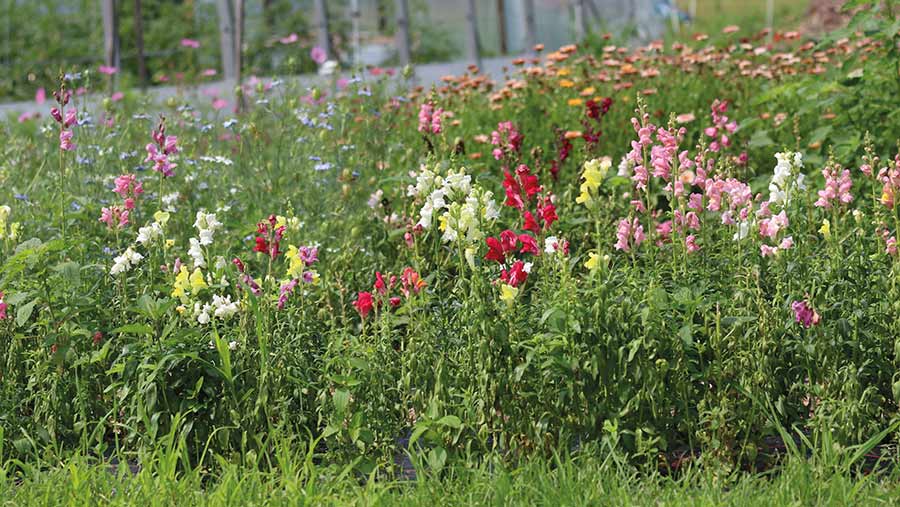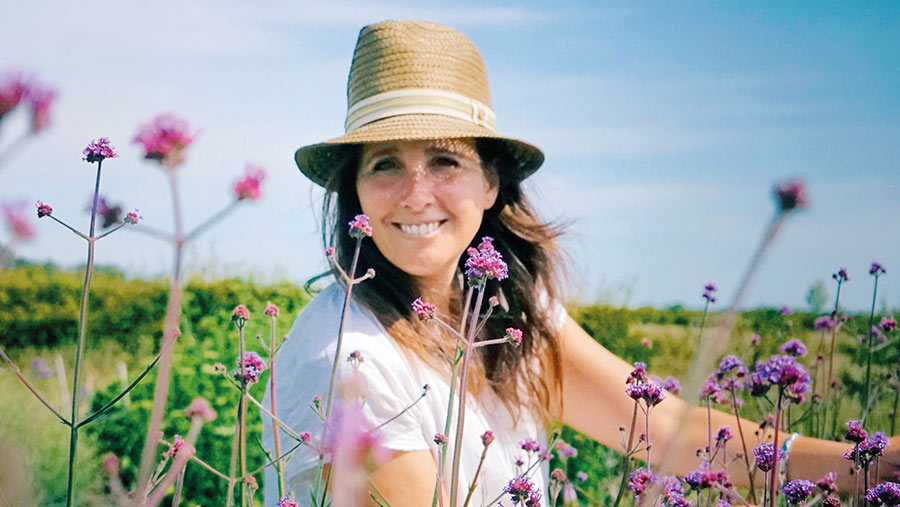So you want to…offer PYO flowers
 © Susan Feldberg/Alamy
© Susan Feldberg/Alamy Although pick your own (PYO) has typically focused on soft fruit, there is now good customer demand for flowers too.
We ask how you can go about setting up a PYO flower diversification and speak to Amber Partner, of Howe Farm Flowers, who developed such a business.
See also: How to go about diversifiying into farm pop-up campsites
Meg Edmonds, co-chair of growers’ association Flowers from the Farm, says customer demand has encouraged more farmers to offer PYO flowers as part of their business model.
“People were a bit nervous about inviting the public onto their land, but are now seeing it as a really useful – and popular – part of their income stream,’’ she says.
“It is all about connecting people with the flowers. The key to the public understanding more about locally grown, seasonal British cut flowers is getting people out onto the farm.’’
However, embarking on a PYO flower operation requires careful consideration and planning.
How will it fit into the farm business?
The first step for farmers contemplating PYO is to consider if it will interfere with the existing enterprises, says horticulture expert Chris Creed, of Adas.
“It is no good starting a pick-your-own business when June and July are the busiest months on your farm, it does take up a lot of time,’’ he says.
Consider carefully who will run the new venture.
Is location important?
Proximity to urban areas and a good road network are no longer prerequisites for a successful PYO.
“With satnavs, people can find more remote places. Some visitors see the journey to the farm as part of the day out and local doesn’t seem to be important any longer,’’ says Mr Creed.
What are the establishment costs?
Expect these to vary according to land type and existing infrastructure.
Compost may need to be imported to prepare soil for cultivating flowers – it’s a good idea to get soils tested to establish what is needed.
Bulbs, seeds and tubers can be expensive – start with some of the cheaper varieties to limit risk – and polytunnels may be needed for cultivating seed.
Factor in costs for dripline irrigation and landscape fabric as a weed barrier.
Signs, parking infrastructure and equipment such as secateurs and buckets for cutting and gathering flowers must also be in the budget.
How do you set a budget?
Work out what it will cost you to grow the crop and offer the PYO experience – factor in production inputs, labour, containers if providing buckets, equipment, marketing, insurance, utilities and a value for your own time as the owner.
If you plan to sell refreshments consider portable toilet rentals, too.
Look at what your competitors are charging – explore other farms’ websites and social media channels.
Some charge by the bucket – £20 for up to 40 stems – or by the stem, with tulips at 50p a stem and alliums 60p.
Convey to customers, through signs and verbal reminders, that PYO farming is your livelihood and that they should only pick what they are going to buy.
Are specialist skills required?
Understanding flower growing and having a passion for it can be more important than skill, although a knowledge of horticulture is useful, says rural business consultant Michael Mack.
Many existing PYO flower businesses offer courses – search for them online and expect to pay about £200 a day.
There are also online courses and opportunities to study at local colleges.
What are the operating hours?
Weekends are popular, but offering group booking sessions to gardening clubs and others can extend the market into weekdays.
Committing to consistent hours is essential. Customer numbers often increase due to word of mouth, but few things will discourage them more than arriving at a farm only to find it not operating the advertised hours.
Communicate weather or condition-related closures and product availability through social media.
Operating a pre-booking service allows customer numbers to be managed.
Customers will need to be supervised to guide them through the plots and find the flowers they are looking for – some will be making their first trip to a PYO operation; signage is helpful, perhaps including the rules of the operation, varieties and prices of products and explaining harvesting techniques to prevent plant damage.
What are the insurance implications?
Insurers must be informed of any new enterprise or activity. Growers increase their liability by inviting the public to come on their property, so public liability limits should be reviewed.
Trade associations often offer discounted deals.
Costs vary widely according to the circumstances of each farm – plot size, exposure, soil type and what is being grown.
How do you decide on pricing?
The purpose of PYO is not to compete with supermarket prices, says Mr Mack.
“For low prices we buy from the supermarket, for convenience we use an online company and get flowers delivered next day to the door, but if we want an experience it is PYO that we turn to.’’
The price point must be high enough to make it profitable, he says.
Many businesses add a buffer to prices to account for flowers that are picked and discarded.
When estimating revenue, consider the number of customers expected to visit, the typical amount of flowers customers will likely purchase, and the estimated price of the products.
The potential income from the sale of non-PYO products should also be assessed.
What are the tax and accounting considerations?
For the purposes of income tax, growing flowers for the PYO market is considered to come within the definition of “husbandry” and would therefore be considered a trade of farming, says Zoe Chandler, a tax specialist at Old Mill.
This means that the profits from this diversification can be included in the farming profits and qualify for farmers averaging.
“As the profits will constitute those of a farming trade, so will any losses, meaning that sideways loss relief is available to reduce taxable income from other sources,’’ says Ms Chandler.
“It also means these profits can be added to other farming trade profits when considering the hobby farming loss relief restrictions.’’
The growing of flowers for the pick your own market would likely be considered agriculture for inheritance tax purposes, as it is for nurseries growing flowers.
For VAT purposes, flowers must be standard rated.
Are there planning implications?
The planning system allows for a farm to sell its own produce, but consent is likely to be needed if you are purchasing other products to sell as part of your offer – check with your planning authority what the rules are for your area as these will be different if, for instance, the farm is in a National Park.
What about risk management?
To help protect your business, post signs indicating where guests are and are not welcome.
Fence off ponds and large equipment areas.
Is it profitable?
Yes, says Mr Mack, but as with any business the key is to keep costs down and minimise exposure to losses.
“Only grow the plants you know will flourish in your climate and soil type, and don’t buy the most expensive varieties,’’ he says.
“Bear in mind also that it is seasonal, mostly late spring to autumn, so cashflow will be seasonal.’’
The biggest variable in PYO sales is the weather and, as most business occurs at weekends, consider how will you manage supply if rain keeps customers away.
Trade associations
Flowers From The Farm
Horticultural Trades Association
- hta.org.uk
- Email: services@hta.org.uk
Great British Flowers
Commercial Horticultural Association
- cha-hort.com
- Email: info@cha-hort.com
- Telephone: 01959 565 995

© Amber Partner
Case study – Amber Partner, Howe Farm
Pick your own is providing an additional income stream in the flower farming enterprise at Howe Farm in Buckinghamshire.
Amber Partner was producing free-range eggs from a flock of 2,000 hens alongside beef, pork and lamb before she decided to take the business in another direction.
“I was pregnant with twins and it physically wasn’t possible for me to do the work,’’ says Mrs Partner.
She committed a field on the 10ha smallholding at Dorton to cut flower production, preparing the land with 26 tonnes of compost, and began supplying blooms for weddings and other events and establishing a subscription service for local delivery.
With only limited experience of growing flowers, Mrs Partner increased her knowledge by joining Flowers from the Farm, a membership association for artisan cut flower growers in the UK, which allowed her to network with other growers and to ask questions, and by reading specialist books.
As the business developed she introduced pick your own.
“I saw it as an easy way to get a return from my flowers from the get-go, and for the business to build a name and a reputation as a flower supplier,’’ she says.
In the first instance, she invited locals to come to the farm to pick flowers, to test the market. When this proved successful, she advertised more widely.
Howe Farm Flowers now offers PYO days from the beginning of June to the end of October on Thursday, Friday and Saturday mornings, and sells light refreshments to customers, too.
Mrs Partner limits customer numbers to 10 for PYO and refreshments, and 10 for PYO only, to ensure that she still has sufficient flowers to supply her other markets.
Bookings are for one-hour slots, payable in advance, with each customer given a 13cm diameter bucket to fill with flowers; in 2021, PYO-only customers were charged £20 a head.
Customers are shown an example bucket of the number of flowers they might be expected to pick – up to 40 stems, a number which sit comfortably in the bucket.
Mrs Partner says this guidance system had to be introduced because some customers were over-picking.
“People like to get value for money, but some were getting a bit greedy and I was losing money.’’
In 2020, she doubled the area under production to an acre, to allow her to separate the PYO flowers from those grown for events and bouquets, to help manage people and the flowers they are cutting.
“In 2022, we are looking to expand the PYO field again so we can meet the demand during the summer months,’’ she says.
An additional cost incurred by opening the farm up to customers is public liability insurance.
Mrs Partner admits PYO isn’t the most profitable side of her business, but it can have benefits for the rest of the enterprise.
“People who come to pick will often sign up for my workshops or will order bouquets and flowers for weddings from me.’’
